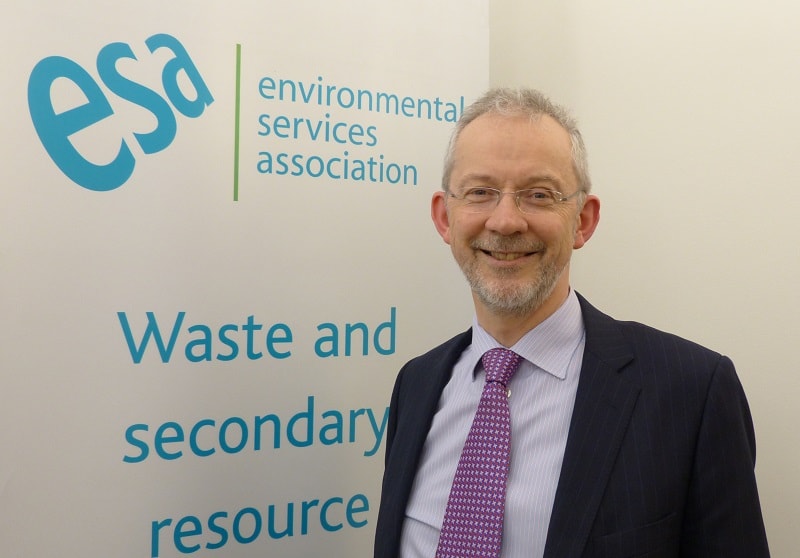ESA will seek to work more closely with government to address challenges presented to the waste sector by the UK’s exit from the European Union, the organisation’s new chairman has said.
In his first major interview since being elected as the chairman of the Environmental Services Association (ESA), Stewart Davies – chief executive of the hazardous waste firm Augean plc – has said that the Association will need to be ‘agile’ in response to Brexit.

ESA chairman Stewart Davies has said that the waste industry trade body will need to be ‘agile’ in its response to the challenges posed by Brexit
And, Dr Davies, who has taken over from the former ESA chairman, Cory’s Peter Gerstrom, said that the waste industry will need to push to highlight the ‘productivity benefits’ available to the UK economy through investment in waste infrastructure. Dr Davies added that he will seek to engage with government on how the industry can play a ‘constructive role’ in economic growth.
He said: “For the trade association to be ready to make the most of the opportunities and grab the risks before they become material will require agility. What’s very good is that in 2016 we’ve made some investments in terms of our strategic thinking so that we’re in better shape to be able to engage with government in strategic discussions over how the industry can play a more constructive role in the UK economy, which is one of the things I am very interested in.”
‘Uncertainty’
Commenting on the perceived risks and uncertainty faced by the waste sector in 2017 and beyond as a result of Brexit, Dr Davies highlighted possible disruption to exports of secondary materials including recyclable waste and refuse derived fuels.
He also noted that movements in currency markets and potential pressure on public spending could act as a barrier to international investment in the UK’s waste infrastructure.
He said: “It is not clear what the trade agreements will be in two years’ time, but we could not manage without those flows of RDF to the European energy from waste facilities but also the recyclate flows that may be destined for the Far East, but a lot of them are logistically going via Belgian and Dutch ports. The fact that there is a lot of uncertainty is really material for the industry.
“This is an opportunity we haven’t had for a generation and we’ll certainly need to have more active engagement with policy makers, regulators and stakeholders to choose the right path in all of that.”
Dr Stewart Davies
ESA
“So the ESA needs to be agile to seize the opportunities and to be clear and strong and effective in spotting the risks and addressing those early.”
Background
A physics graduate – with a PhD in materials science from the University of Cambridge – Dr Davies’ career has seen him work across a broad spectrum of sectors including petrochemicals, steel, cement manufacturing and facilities management, before he was appointed chief executive of the hazardous waste specialist Augean plc in August 2013.
Sustainability has been one of his major areas of focus for over a decade – having served as the business commissioner of the UK’s Sustainable Development Commission between 2006 and 2010.
And, after being a board member of the government’s science and technology development fund –Innovate UK – for six years (2009 to 2015), Dr Davies says he has experience to help present a ‘clear case’ to government to inform any potential spending or policy decisions.
But, the waste sector has ‘a lot to do’ to get its key messages across, he warned, and should seek to emphasise the potential for investment in the waste sector to boost UK productivity – identified by the Chancellor Philip Hammond in his autumn budget statement as an area where the government is to focus.
“Because our impact is systemic rather than sectoral we have a bigger challenge,” he explained. “There isn’t a recycling and waste sector team within BEIS [the government’s Department for Business, Energy & Industrial Strategy], in the same way that there is a chemicals or an automotive sector team. Actually we have an impact on all of those areas and the rest of the economy besides. I think that is a challenge we have got, but of course it is also an opportunity because the leverage you can get from smart thinking in systems and infrastructure is enormous.
“One of our priority pushes is to get a very strong benefit from economies of scale in waste recycling through standardisation – working in bigger blocks of localities and regions in order to get after the next quantum of opportunity. Another key role we’ve got is that we are playing a central part in growing renewables energy through the biogenic carbon materials that go through energy from waste plants.”
Brexit
Commenting on what he felt the ideal scenario for the waste industry would be from Brexit, Dr Davies said that leaving the European Union could create an opportunity to create legislation that is more attuned to the needs of the UK.
“Neither to us nor to Defra does that mean any backsliding or becoming the dirty man of Europe, rather actually making ourselves a bit more fast moving to our immediate challenges and priorities,” he explained. “This is an opportunity we haven’t had for a generation and we’ll certainly need to have more active engagement with policy makers, regulators and stakeholders to choose the right path in all of that.”
The post ESA chairman pledges ‘agile’ response to Brexit appeared first on letsrecycle.com.
Source: letsrecycle.com Waste Managment



